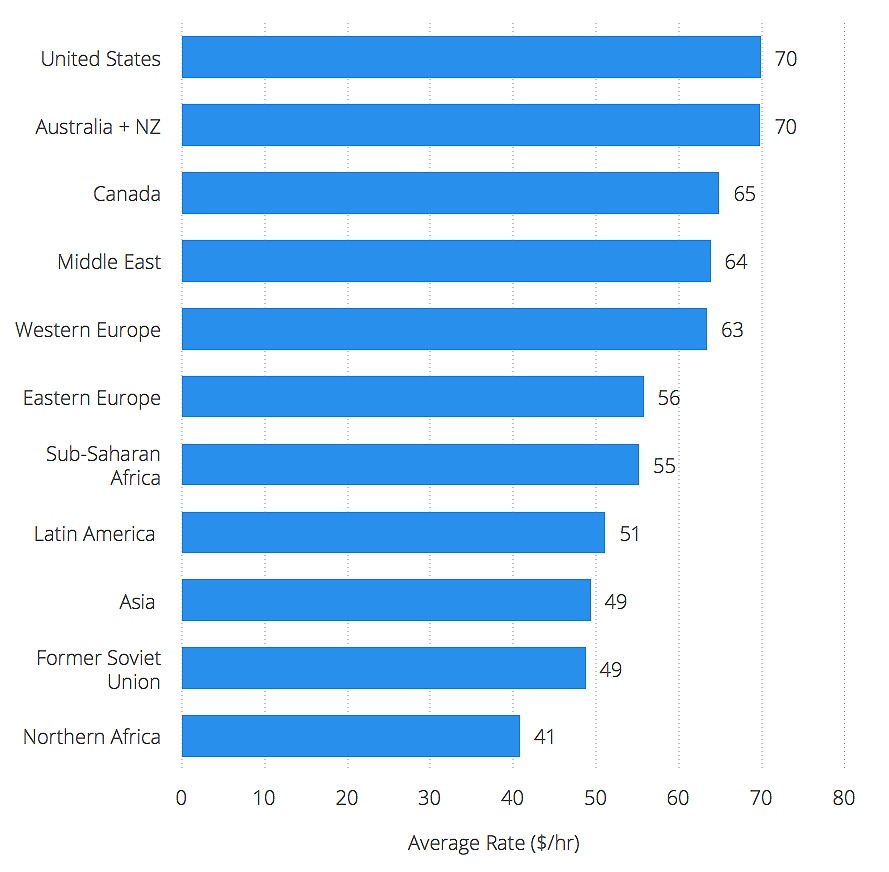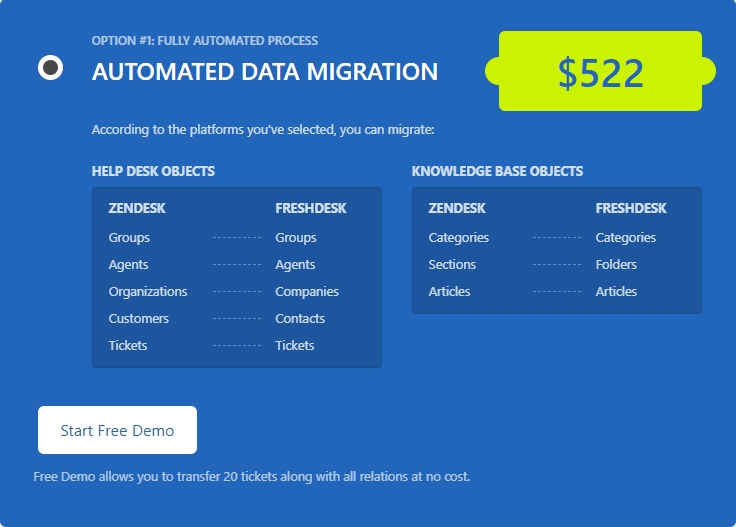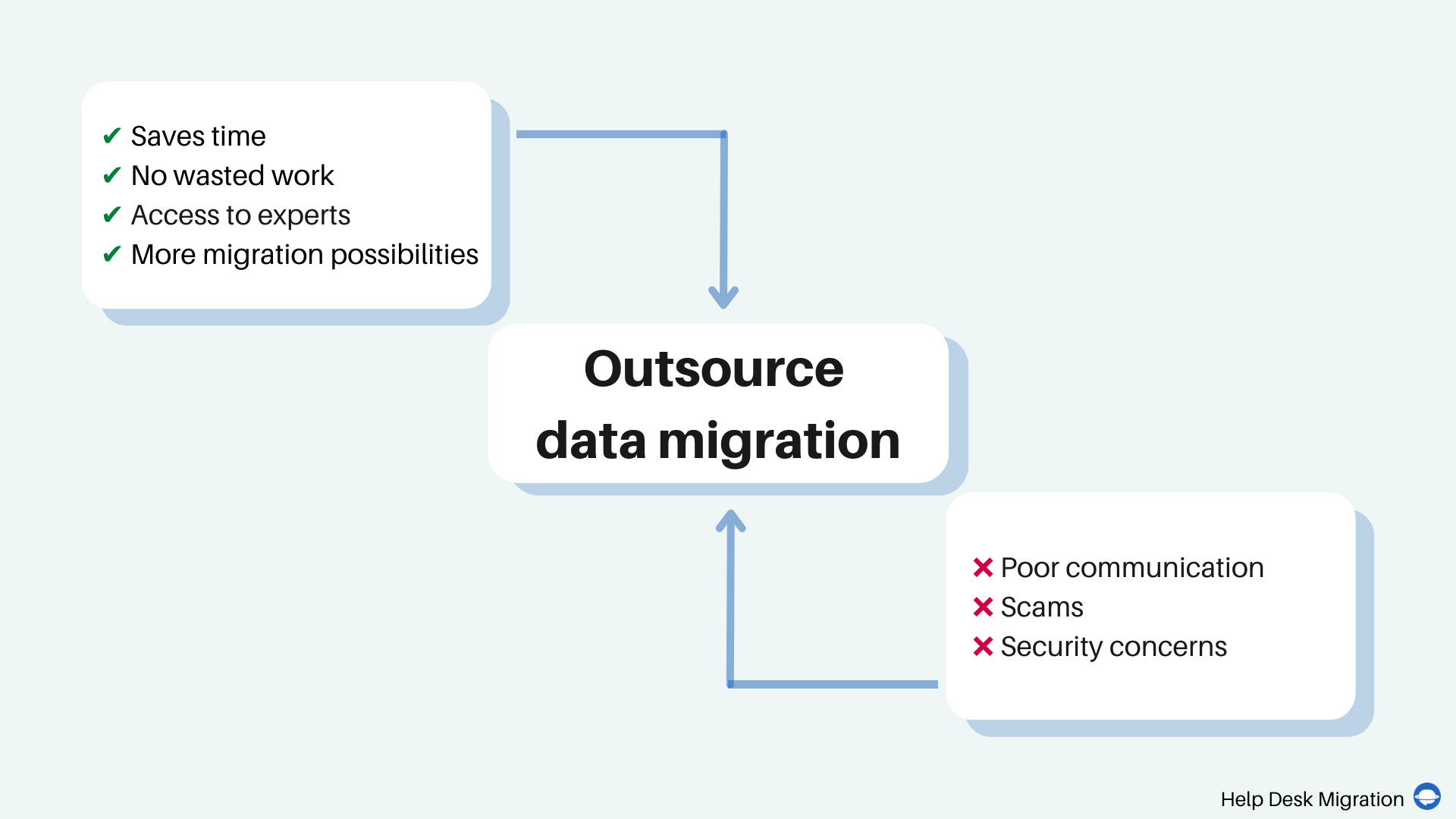We’ve been doing data migrations since 2016. Typically, companies tend to look for ways to outsource their data migration needs to someone more versed in this space. And to the surprise of none! For many, it is a huge undertaking as they have to ensure that all data will be moved and figure out how to do it in the first place. It is a long and stressful process that requires a lot of time and money if you do it for the first time.
To help you weigh all the pros and cons of outsourced data migration, we must answer the following three questions:
- What are your best options for outsourcing data migration?
- Should you outsource if such a possibility arises?
- Is it cheaper than doing it on your own?
There’s a lot to cover, so let's not waste time and dive into the answers.
Who is there to migrate the data for you?
Here’s who can help you move your records between systems:
- A data migration company
- Independent developers or freelancers
- An outsourcing agency
- The vendors themselves
Let’s take a closer look at how these three compare to one another.
Outsourcing to a data migration company
Opting for this option can be beneficial in a lot of cases. However, some of you might be led to believe that we’re biased, but we aren’t - and here’s why.
First, such types of migration providers don’t really mess around and waste time. They want to keep themself afloat, meaning that they will invest all of their resources and money in improving the core service.
Second, such providers usually have self-service tools that you can use to migrate things on your own or they might offer to do the migration process themself. In both cases, your migration will be completed in a fast and effective manner. Also, by outsourcing your migration project to a company you get to test the solution first and see how it works and how you can take advantage of it. Generally, most companies also offer a free demo that might show you some useful things that aren’t as heavily advertised.
Third, companies like us often work hand in hand with software providers. What this means is that they can provide better quality migration and in case of need, request improvements to the API.
Do keep in mind though that such providers are for-profit companies, and to use their services you need to set a separate budget. Every company is different about how they price their services but we’ll get into the financial aspect a bit later.
Hiring an independent developer
Another option is to find data migration services on freelance websites like Fiverr and Upwork. These platforms offer a handful of choices as you get to filter the pricing per hour, deadlines, and whatnot. On the low-end spectrum, you have prices starting as low as $4.30 per hour. However, certified developers such as Salesforce admins or Zendesk developers charge anywhere between $85 to $125 per hour. Suffice it to say, the quality between these two will be substantially different.
Yet, the main issue with such platforms is that there’s such a huge variety of candidates to pick from, you are bound to experience a lasting choice paradox. Furthermore, you will almost certainly spend a considerable amount of time searching, messaging, checking, and negotiating, with freelancers, delaying the migration even further.

We’ve scanned the reviews and even seemingly decent developers do this
In the end, someone paid $333.36 and didn’t get the job delivered.
According to the 2017 survey, the cost of services also depends on the years of experience and the origin country. The average hourly rate in the USA is the highest. It means that you are required to pay a USA developer more than a freelancer from Northern Africa. The least expensive region as Eastern Europe showed average rates of about 30% - 40% less than the most expensive regions like Australia and Canada.

Hiring the outsourcing agency for making the data transfer
When you hire an outsourcing agency, you entrust the whole data migration process to a specialized developer and get the work done without spending much effort and time on organizing the process. Especially, when you don’t have the data migration expertise to take a team through every step of the way. In this case, an outsourcing agency is the best bet to reach a particular result in the best way possible.
So, why choose the outsourcing agency? Here are the reasons why:
Invest in flexibility and specialized expertise
While you can search for an experienced freelancer for weeks, an outsourcing agency can bring in developers with a very specific skill set quickly.
An outsourcing agency has access to a huge pool of talent so they can engage developers based on specific requirements. This scenario is perfect for small migration projects. Once data migration is complete, you can just stop cooperating with the expert. This way, you don’t hire a full-time employee with a general set of IT skills who might not handle data migration.
Run your business cost-effectively
When you choose to cooperate with an outsourcing agency, you can save considerable business investments. By outsourcing a data migration expert, you can cut off overhead costs like hardware or office supplies. An outsourcing agency itself handles everything from compensating sick leaves to paying taxes for the employees.
However, an outsourcing agency might not be as involved as an in-house specialist would. The lack of communication can harm the further migration project.
Asking the vendor to migrate your data
Sometimes a software provider that you’re switching to can migrate the data for you, or offer a self-service tool to import tickets by yourself.
Many help desk software providers allow importing tickets from a CSV file, JSON, or XLS, and almost everybody has their API documentation available for anyone to use. And this is where the main problem lies. Why waste time studying the ins and outs of the target platform when you can give the job to someone who already knows how each tool operates? This will not only save you a lot of time but will ensure that nothing will go wrong during the transfer process, which leads us to the key point.
Very few help desk providers take over the migration process completely and those that do can have you wait for weeks or even months. Chances are that you’re not the only customer who wants their data migrated. So, you might have to wait until it’s your turn.
Figure 1: Comparison of data migration company vs vendor
Category | Data migration company | Vendor |
Payment | only the records moved | if the option is included in your pricing plan |
Advantages |
|
|
Disadvantages |
|
|
How much for the data?
Let’s talk numbers now. We’re going to calculate how much it will cost to migrate your data in each case.
Internal IT team
According to PayScale, the average hourly rate of a software engineer in the US is $36.51.
Considering that the migration itself will take approx. 55 hours will cost you $2008.05. But that’s just the migration. And that’s if only one person on the team gets involved. Usually, migration involves more workforce which further multiplies the average price.
Freelancers
While moving from one instance to the other takes roughly 55 hours, the average price for such a service using a freelance service will vary dramatically.

Freelancers such as Zafar are a rare sight. The average rate per hour is nearly double what he is charging.
As we already mentioned, you can go as low as $4.30 per hour but that doesn’t mean that you will get a good result. Scouting Upwork for data migration services, we’ve come to the conclusion that the average price is $65 per hour which is $3135 per project.
Data migration tool
Moving your stuff with a dedicated tool might not necessarily be cheaper but you do get the advantage of your stuff being moved fast and effectively. Furthermore, you don’t have to bother with freelancers escaping mid-project nor do you need to think about the things that didn’t make the cut.
Usually, you have to pay only for the records moved so the final price is directly dependent on the number of records you want to move. Moreover, with a smaller number of records, it’s more likely for you to pay less using a migration tool than working with an outsource specialist that will write a script from scratch.
For example, with our Help Desk Migration service, you can transfer 2000 Freshdesk records to Zendesk for 522$ only.

Of course, everything depends on the source and target platforms and the number of records could be higher. But now think how much would you pay a freelancer that will write code in the same case from scratch and has its work paid in hours.
Figure 2: Comparison of freelancer vs outsourcing agency
Category | Freelancer | Outsourcing Agency |
Payment | hourly | hourly |
Advantages |
|
|
Disadvantages |
|
|
Advantages of Outsourced Data Migration
On the surface, it might not look like there are a lot of benefits but that is not the case. Here are some of the more substantial ones.
- Saves time. Everything is ready to be loaded and migrate right from the get-go.
- No wasted work. Save time and money by completely eliminating unnecessary work like writing a one-time-use migration script.
- Access to experts. Not all companies have the technical capabilities or people to write the script and migrate things effectively.
- More migration possibilities. By using professional migration tools, you get more migration possibilities, including things such as filtering, data separation, ability to migrate things in several steps.
It’s way faster to hire a data migration specialist or team. This is especially true if you have never dealt with data migration in the first place. Why waste time studying the ins and outs of the target platform when you can give the job to someone who already knows how each tool operates? This will not only save you a lot of time but will ensure that nothing will go wrong during the transfer process, which leads us to the next point.
Yes, as we already said, reliability is something that cannot be ensured unless the target and the source platform are carefully studied. Knowing how each tool accepts and interprets the incoming data will allow you to avoid a mismatch between fields, data corruption, or worse yet, data loss.
And the last thing we’d like to note is data security. In 2019 alone, Norton, a well-known security software development company reported that roughly 4 billion records have been breached so far. It is a widespread problem and during any migration process, your data is vulnerable to attacks and theft. Opting to use a dedicated migration service will help you avoid such troubles as specialists know exactly how to safeguard your information.
Disadvantages of Outsourced Data Migration
- Poor communication. There is a slight possibility that the company you are working with might be located at a different timezone than you. Add a language barrier to the mix and you might have a hard time finishing things up. Although, a professional will never forget about you and will keep you up-to-date on a regular basis.
- Scams. As much as we’d want to omit this possibility but you can never be too sure. When we scrolled through feedback and reviews on Upwork, we noticed that some companies paid to see the work being started but never finished.
- Security concerns. When you are doing data migration, you entrust years of your work to people you don’t know. Some companies are trustworthy, while others might prove to be malicious. Always pay close attention to their policies and demand documented guarantees to avoid data losses.
High-quality outsourcing data migration services can cost you money. Plus, not everyone is willing to dish out cash just to move their data from one place to another.
Most paid migration services charge only for the number of records moved which is fair and justified. And free migration solutions give absolutely zero guarantees that your data will be safe.
It is a fair reason but we’ll be honest with you, most migration services charge only for the number of records moved which is, frankly, fair and justified. And if you think a “free” solution will do the trick, we highly recommend that you avoid using free software (unless stated otherwise). That's because you will have absolutely zero guarantees that your data will be safe or worse yet, not stolen.
Another con that comes into mind is business downtime. And if we are being honest, no matter what kind of migration option you decide to go with, you will have to stop work. But here’s another catch. If you are doing it on your own, it can take you upwards of weeks just to figure out data dependencies. Delegating the process to experts will slice the time in half if not more.

Pros & cons of outsourcing data migration
What Is It the Right Thing To Do?
We can’t say definitively that one method is better than the other. In fact, if you know exactly how both systems work and what are the potential caveats, then you will have zero issues moving your data. However, if you are doing it for the first time, then we suggest that you stop and ask for help. If you value the integrity of your data, of course.
Things can go sought very fast and recovering lost information will never result in 100% restores. But ultimately, it is your call and you have to decide which method is better for you. We can help you by providing you with some helpful tips that you can employ during your migration process.
Tips and Tricks To Follow
So, if you decided that you got this and there is no need to outsource the migration process, here are some tips that will surely help you out in your migration journey.
- Understand your mapping (here’s what it is and why you should do data mapping)
- Keep an eye on security leaks
- Ensure data compatibility beforehand
- Don’t rush things, dedicate an entire day to the process
- Always do backups before doing anything
- Notify your customers about the downtime
Keep in mind that these are only the basics. If you want to learn more about the process, you can check out our list of rules to follow during data migration. These will not only help you move stuff but will ensure that you avoid common pitfalls.
Let’s Move Your Stuff
If you decided that moving data manually isn’t your cup of tea and you rather have experts do it for you. Consider using our services. We have been on the market for ages and we know how different systems work. Just give us a call or drop us a message and we will make sure that your data is transferred in a fast, safe, and effective manner.


